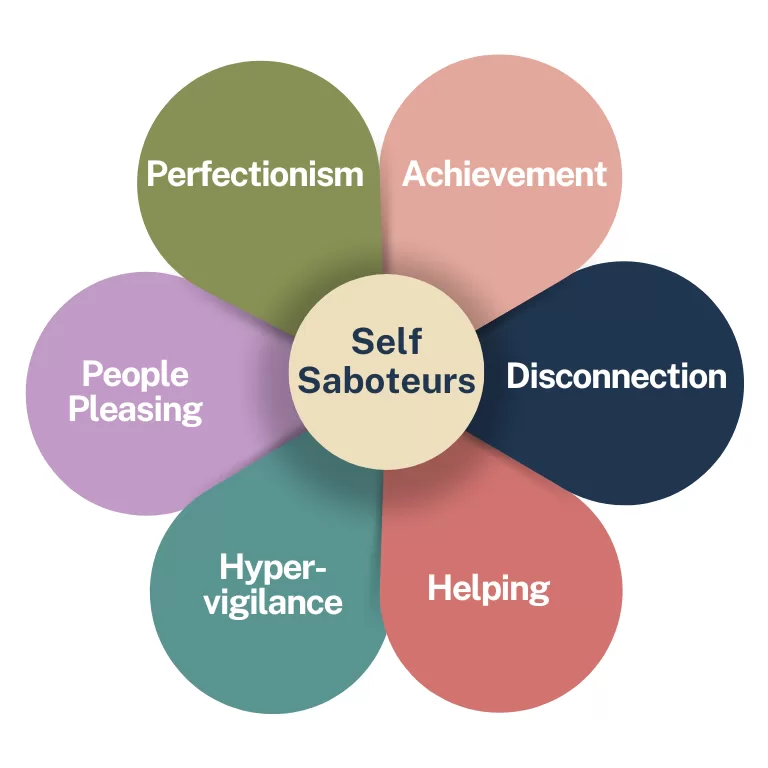Six Self Saboteurs
We all have habits and patterns that once helped us be successful, but now hold us back. At Liberare Consulting, we call these internal blockers the Self-Saboteurs.
They often show up as strengths: a drive to achieve, a desire to help, a commitment to getting things right. But left unchecked, they quietly undermine our potential, distort our choices, and keep us stuck in cycles that no longer serve us.
Based on our work with thousands of leaders and professionals, we’ve identified six core self-saboteurs that commonly show up in high achievers and caring professionals:
- People-Pleasing
- Helping
- Hyper-Vigilance
- Disconnection
- Perfectionism
- Achievement
Each one is rooted in early experiences and plays out in your career, relationships, and self-perception, often without you realising it. The good news? Once you can spot them, you can shift them.
Click the links below to dive deeper into each self-saboteur. You’ll learn how they develop, how they show up at work and in life, and how to begin breaking free.
And if you want to find out which are your dominant self-saboteurs, why not take our quiz here.
The Achievement Saboteur: Why High Achievers Struggle with Self-Sabotage
High performers are often admired for their competence, resilience, and ability to conquer seemingly insurmountable challenges. Their competitiveness and willingness to take responsibility mean that they are given opportunities to prove themselves.
They are seen as competent and often become a ‘go-to’ person in a team. However, lurking beneath the surface of success, many face a hidden adversary: the Achievement Saboteur…

The Outsider Within: How the Disconnection Saboteur Holds You Back
For many, the pursuit of personal and professional growth is deeply intertwined with connection, be it to others, to purpose, or to a sense of belonging. Yet, for some, a hidden force stands in the way: the Disconnection Saboteur.
This saboteur quietly undermines an individual by fostering feelings of isolation and detachment, even in environments designed for collaboration and inclusion.

The Helping Trap: How the Helping Saboteur Derails Your Success
Helping others is often seen as one of the most positive traits a person can possess. However, for those in the grip of the Helping Saboteur, this impulse to assist can lead to burnout and frustration.
By prioritising others’ needs above their own, individuals caught in this dynamic risk neglecting their own goals and well-being, ultimately limiting their growth.

The Hyper-Vigilance Hijack: How Constant Alertness Sabotages Peace and Progress
Hyper-vigilance can feel like a superpower. It keeps you alert, ensures that nothing slips through the cracks, and gives you the edge to anticipate challenges before they arise.
However, when driven by the Hyper-vigilance Saboteur, this constant state of heightened awareness turns into an all-consuming, self-sabotaging cycle. It prioritises control and avoidance of risk over balance and well-being.

The Cost of Yes: How the People Pleasing Saboteur Undermines Your Potential
In our interconnected and often conflict-ridden world, the ability to cooperate and seek harmony is often, rightly, seen as a strength. However, for those influenced by the People-Pleasing Saboteur, an over-use of this trait can become an obstacle rather than an asset.
Driven by a need for approval and a fear of conflict, this saboteur undermines self-identity and growth by prioritising others’ feelings at the expense of one’s own.

The Perfectionist’s Paradox: How Perfectionism Sabotages Success
Perfectionism is often celebrated as a virtue in modern society. The drive for excellence and high standards can propel individuals to achieve remarkable feats. However, for those ensnared by the Perfectionism Saboteur, this quest for flawlessness becomes a double-edged sword.
While striving for perfection can bring short-term rewards, in the long run it often leads to burnout, procrastination, and self-doubt.



